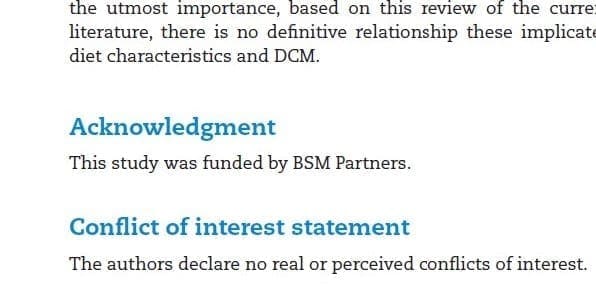Pet food industry funds consultancy that funds ‘study’ asserting no link between diet and canine heart disease – – and no conflicts of interest
***This story has been updated.***
Buzz is building in veterinary circles over a study published in a prestigious academic journal. This week, a group of veterinary academics published an article under the auspices of Oxford University Press’ Journal of Animal Science declaring no link between grain-free diets and canine dilated cardiomyopathy (DCM).
The article’s publication comes almost exactly one year after the U.S. Food and Drug Administration issued a third report on its investigation into reports of canine dilated cardiomyopathy (DCM) – a heart disease that can eventually lead to congestive heart failure – and possible links to certain types of pet food diets. Many such diets labeled as “grain-free,” the FDA wrote in its June 2019 announcement, “contained a high proportion of peas, lentils, other legume seeds (pulses), and/or potatoes in various forms (whole, flour, protein, etc.) as main ingredients.”
The FDA also took the unprecedented step of singling out the specific brands of pet food that had been most frequently linked to reported cases of DCM.
Not surprisingly, the FDA’s targeting of these brands sent shockwaves across the dog-owning world and posed a major threat to grain-free dog food producers.
“We understand the concern that pet owners have about these reports: the illnesses can be severe, even fatal,” the FDA said in the report, adding, “The FDA is using a range of science-based investigative tools as it strives to learn more about this emergence of DCM and its potential link to certain diets or ingredients.”
Asked to comment on the JAS article and its rebuke of FDA’s reports, FDA spokesperson Anne Norris wrote in an email, “The FDA does not typically comment on specific studies, but evaluates them as part of the body of evidence to further our understanding about a particular issue and assist in our mission to protect public health. We are continuing to investigate cases of DCM reported to the agency and will communicate publicly about any significant developments.”
The Journal of Animal Science article concludes with two bewildering statements. First, an ‘acknowledgment’ that the study is funded by BSM Partners. Second, and directly beneath the acknowledgement, a ‘conflicts of interest’ statement:
The authors declare no real or perceived conflicts of interest.”
What is BSM Partners, the company that paid for veterinarians and scientists who wrote the article that happens to be favorable to pet food industry interests? Nobody seems to know. BSM Partners has no website apart from DCMResearchProject.org, which lists the veterinary academics and summarizes the Journal article funded by BSM Partners. The website also describes BSM Partners as “the leading pet care research and consulting firm” before proceeding to refute the FDA reports. “Despite much discussion regarding the hypothesized link between grain-free and legume-rich diets and dilated cardiomyopathy (DCM), more data is needed to draw sound conclusions about the relationship between nutrition and canine cardiac disease,” BSM writes on its ‘research’ website. Emails sent to addresses listed for BSM bounced back (media@bsmpartners.net; info@bsmpartners.net ). The domain name, BSMpartners.net, is privately registered, meaning that the person or entity that owns the name cannot be easily traced. DCMResearchproject.org is also privately registered.
But in an announcement posted on petfoodindustry.com — a website that is published by Watt Global Media, which describes itself as providing ‘exceptional business content and solutions to the agrifood and pet food industries – researchers are characterized this way: “veterinarians, veterinary cardiologists and animal nutritionists from BSM Partners, a pet care research and consulting firm, who analyzed more than 150 studies for the peer-reviewed article.” It goes on to describe the article as “an exhaustive literature review regarding the causes of DCM.” Then, it quotes the academics who authored the article.
“We wanted to gain the best understanding of this issue, so we examined the results of more than 150 studies, which taken together did not support a link between grain-free and legume-rich diets, and DCM,” Dr. Sydney McCauley, an animal nutritionist and the article’s lead author says in a statement on petfoodprocessing.net. “What the science does make clear is that DCM is largely an inherited disease,” Dr. McCauley added.
Dr. McCauley could not be reached for comment. The Journal of Animal Science lists Dr. Sally Johnson as its editor, but provides no direct contact information for Dr. Johnson, or any individual; instead, readers are directed to Oxford University Press.
Dr. Eva Oxford, a board-certified veterinary cardiologist and co-author on the article, issued the following statement to The Canine Review by email:
Our team of veterinarians, veterinary cardiologists, and animal nutritionists work every day with the largest pet care companies and the smallest upstart entrepreneurs to help ensure the safety of their products, including grain-free and grain-inclusive dog foods, treats, and supplements. This board-invited and peer-reviewed examination of more than 150 studies was self-funded and reflects our dedication to canine health. Our team followed the guidelines as provided by JSA, our conclusions are our own and based on publicly-available research.”
The email, which included a BSM Partners signature, was sent from the domain name ‘bsmpartners.vet’, another address whose registrant TCR was not able to identify. And, according to the authors’ own acknowledgement statement in the study, “self-funded” means ‘funded by BSM partners.’ And BSM’s funds come from fees it charges its pet food industry consulting clients.
Emails sent to co-author Dr. Renee Streeter asking about what if any conflicts of interest policies they followed were not returned.
Dr. Renee Streeter’s financial relationship with BSM Partners is explicitly disclosed in many places; however, there’s no clear disclosure in the Journal of Animal Science article itself. “Full-service consulting firm, BSM Partners, and R.M. Streeter Animal Nutrition have merged to create BSM Clinical Nutrition. Dr. Renee Streeter, DVM, DACVN (Diplomat of the American College of Veterinary Nutrition), will lead operations at the firm,” a press release issued by BSM last year stated.
The Journal of Animal Science, whose publisher is Oxford University Press, does not list policies about conflicts and disclosure on its website. Emails to Oxford University Press’ spokespeople and staff seeking comment about what, if any, conflicts policies are in place at JAS, and how the policies are implemented have not been returned.
Amid all the opaque aspects of how this article came to be published, what does seem clear is that BSM’s client base is the industry with a strongest interest in contradicting the FDA’s findings about canine dilated cardiomyopathy (DCM). What is also clear is that a study financed by BSM has now contradicted the FDA and cleared that industry of responsibility for a significant canine heart disease.
According to members of the Veterinary Information Network, an online community for veterinarians, the article has received much criticism on the message boards. One board-certified veterinary cardiologist gave permission to share his comment: “Shouldn’t someone demand that this paper be retracted?”



lbk98
June 22, 2020 @ 12:34 pm
Thank you so much for this excellent review. I can help you fill in some of the pieces re BSM PARTNERS. Zignature, the number 2 brand linked to DCM as reported to the FDA lists BSM Partners as their formulation team. Dr Bradley Quest, one of the review authors is employed by BSM AND promoted as Zignature’s staff Veterinarian on their website.
Yet they claim “no conflict”. If anyone has something to benefit from an attempt to disregard the correlation betw certain diets and DCM its Zignature and BSM partners.
lbk98
June 22, 2020 @ 12:35 pm
Link https://zignature.com/wsavaguidelines/